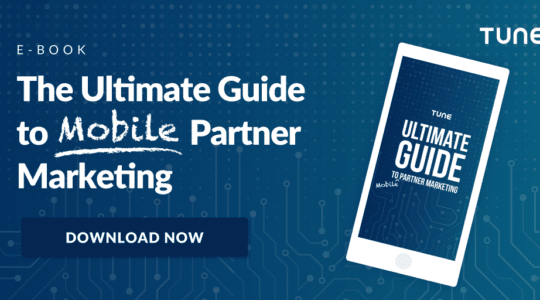
As an advertiser or marketer, what does it mean to be ethical and innovative when using data in your online campaigns and promotional efforts? Does the analysis change if you are targeting children online?
At a recent privacy conference, David Hoffman, Intel’s Chief Privacy Officer, encouraged attendees to promote the “ethical and innovative use of data” by tweeting in support of the #datainnovationpledge. In this post, I discuss what it means to be ethical and innovative when it comes to using “sensitive” data in your digital advertising efforts, especially personal data collected from children.
Why do we Care About Marketing to Children?
A couple of weeks ago, I hosted my first TUNE webinar, where we discussed one of the most controversial areas involving sensitive data and digital advertising – marketing to children in compliance with the Children’s Online Privacy Protection Act or COPPA.
COPPA, one of the strictest privacy laws on the planet, requires that sites or apps directed to kids provide parents notice and get their “verified” consent before using a child’s information to target advertising online. Such notice and consent requirements can interrupt and complicate the user experience on a site and app. This is a primary reason that COPPA compliance remains a concern for many content developers.
Complying with COPPA is clearly a difficult legal issue, but it’s also an ethical one. Even if you were not following COPPA’s requirements for your kid-directed site/app/content and getting away with it, could non-compliance send the wrong message to your users and their parents? What if you are also targeting the parents as users on your other mixed-use or adult-only apps? Would you care more?
Ethics, Privacy & User Expectations
Current technologies allow advertisers and marketers to be incredibly innovative when it comes to using data and technology in their campaigns. Some companies also aim to be ethical – not simply following a law or regulation for compliance’s sake, but also taking into consideration whether use of a particular type of data for targeted advertising would be the “ethical” or right thing to do.
Ethics and privacy in the US and most jurisdictions are closely aligned with another important concept: user expectations. As we know, there is no specific right to privacy in the US constitution. However, the Fourth Amendment does protect against “unreasonable” government search and seizure, and also provides us a constitutional foundation for the idea that when it comes to privacy, user expectations are a key part of the calculus.
For instance, there are many concerns that arise when marketers use “sensitive data,” such as children’s data, to target advertising online. In these cases, the FTC recommends getting the user’s explicit consent first, and providing meaningful, timely notice – in addition to any additional legal requirements (e.g. ensuring that you comply with the Fair Credit Reporting Act for any data you collect that is used to extend credit, or in employment and insurance decisions). The FTC sees notice and explicit consent as an important way to manage the user’s expectations about how sensitive data about them is being collected and used.
Not taking user expectations into account can also cause users to lose trust and even disengage from your site or app. In a Guardian poll surveying users after Facebook’s secret June 2014 newsfeed experiment, 84 percent said they had lost trust in the social network, with 66 percent contemplating closing their Facebook accounts altogether.
Another instructive example is the “experiment” by OkCupid, which provided users with “bad” matches as dating choices without any notice (the company later emailed users to explain that it was all just an experiment). Although OKCupid insists they had the legal right to conduct the experiment, whether it was ethical is doubtful, particularly given the backlash from outraged users (this Computerworld article suggests that the OkCupid experiment was both illegal and unethical). In both cases, Facebook and OKCupid decided to manipulate user data that had been provided to them for other purposes (social networking, dating) – thereby undermining user expectations and destroying user trust.
In Summary
The question of whether to use sensitive data, or any other type of personal data to target advertising will always depend on your site’s content and the audience you are trying to reach. Perhaps an innovative, kid-directed site is part of your long-term business goals and strategy. But regardless of your business model and focus, it’s always worth taking a moment to ensure that your use of sensitive and personal data is not just innovative, but also ethical. And an important way to determine this is to see whether what you are doing matches user expectations in terms of the notice and choice you provide. This is important, not just for the growth of your business, but also to maintain the trust of your users, upon whom your ultimate business success depends.
If you are wrestling with decisions around how to innovate, be ethical, and be compliant at the same time, and want to share your experiences, myself and my colleagues at TUNE would love to hear from you. We are launching The Source: Data & Privacy Insight for the Digital Community, a bi-monthly newsletter to help you and your organization better understand the myriad issues surrounding data and privacy in online advertising today.
You can sign up to receive the newsletter here.
Looking ahead to continue the discussion on ethics and innovation – as well as other issues at the intersection of advertising, data and end user privacy.
Thanks for TUNEing in!
* To drill down into user expectations and the Fourth Amendment a bit more, check out this article from the Daily Princetonian, describing the expectations that we as citizens should have about government access to our meta data in the wake of the Snowden revelations.
Author
Becky is the Senior Content Marketing Manager at TUNE. Before TUNE, she handled content strategy and marketing communications at several tech startups in the Bay Area. Becky received her bachelor's degree in English from Wake Forest University. After a decade in San Francisco and Seattle, she has returned home to Charleston, SC, where you can find her strolling through Hampton Park with her pup and enjoying the simple things in life.




Leave a Reply
You must be logged in to post a comment.